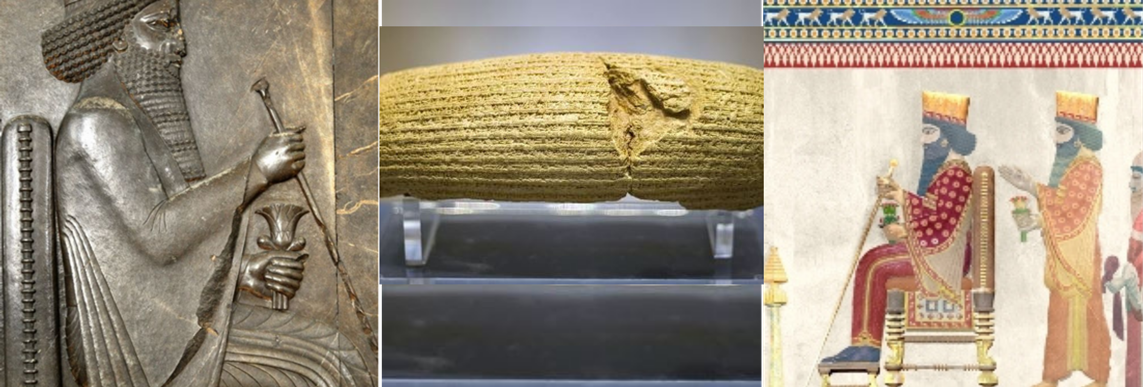- Aryan Nomads (Indo-European) came to Persia ~ 7th Century BCE
- Median & Achaemenid Empires Ruled from 7th to 4th BCE
- Alexander and his followers (the Selukian) Ruled from 334 BCE for 100 years
- Iranian Partians: Ashkanian Ruled from 224 BCE to 470 CE
- Iranian Parsi: Sassannian Ruled from 129 to 641 CE
Achaemenid Dynasty 550 -330 C.E.
- The Achamenid / Hakhamanishiyan Dynasty (559–330 CE) defeated the Medians and became was one of the most glorious dynasties of Iran. It was founded by Cyrus built the empire from the Aegean Sea to the Indus River. Xenophon the Greek soldier and author has recorded him as a tolerant and ideal monarch who was called the father of his people by the ancient Persians. In the Bible he is the liberator of the Jews who were captive in Babylonia. In short, the figure of Cyrus has survived throughout history as more than a great man who founded an empire. He became the epitome of the great qualities expected of a ruler in antiquity, and he assumed heroic features as a conqueror who was tolerant and magnanimous as well as brave and daring. Cyrus’s own words have been preserved in Babylonian cuneiform script in a clay proclamation called the Cyrus Cylinder, discovered in Babylon in 1879. The barrel-shaped cylinder records Cyrus’s conquest of the city in 539 BCE In 1971 Mohammed Reza Pahlavi offered a replica of the Cyrus Cylinder to the United Nations, in order to show that Cyrus made the first charter of human rights.
- Another important king was Darius I who extended the empire as far west as Macedonia and Libya and as far east as the Hyphasis (Beās) River (Pakistan); it stretched to the Caucasus Mountains and the Aral Sea in the north and to the Persian Gulf and the Arabian Desert in the south. He was a great architect. At Persepolis (TakhteJamsheed) in Fars, he founded a new royal residence to replace the earlier capital of Pasargadae. Another king was Khashayarsha/Xerxes the Great whose best known for his massive invasion of Greece.
- The last king, Darius III, was defeated by Alexander in 330 C.E.
Iran - Darius and Cyrus – 530 C.E.


